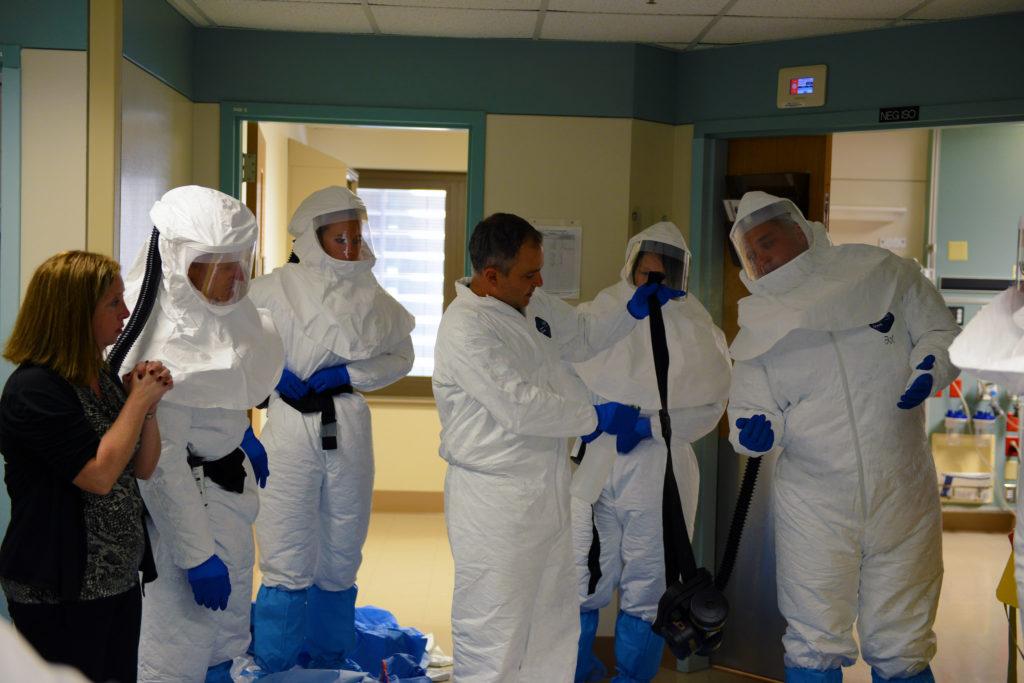Ebola hysteria has swept across the nation. It has taken over our news stations and papers, and is consuming the time of our president and politicians. Dominating social media and kitchen table conversation, it has Americans panicking at the thought of an outbreak.
Late last month, New York and New Jersey issued mandatory quarantines for health workers who have come into contact with Ebola patients and are re-entering the US from West Africa.
A Maine nurse returning from Sierra Leone was the first to be subjected to the new policy.
Kaci Hickox, a Doctors Without Borders nurse who was treating Ebola patients, landed at Newark International Airport in New Jersey on the morning of Friday, Oct. 24. Despite showing no symptoms of the virus, Hickox was placed into quarantine at University Hospital in Newark where she stayed for three days. On Monday, Oct. 27, after a preliminary test showed no signs of the virus in her system and being symptom-free for 24 hours, the New Jersey Health Department said Hickox would return to Maine by private plane.
New Jersey Gov. Chris Christie received immediate criticism from civil rights groups, health aid agencies and White House officials for the treatment of Hickox, and rightfully so.
Two days after Hickox’s quarantine, New York Gov. Andrew Cuomo issued revised procedures for handling medical personnel returning from West African nations with Ebola outbreaks. Good call.
In a Dallas Morning News article written by Hickox while in quarantine, with the help of Seema Yasmin, a Dallas Morning News staff writer, Hickox gave her account of her quarantine.
Upon informing an immigration officer that she had just returned from Sierra Leone, Hickox was guided to the airport’s quarantine office. She describes a frantic scene with people in protective white suits, gloves, masks and disposable face shields scurrying around the office. She was questioned by multiple officials about her trip and interrogated like a criminal by one immigration officer. Her temperature was taken twice, a few hours in between. The first time it was 98. The second time it was 101, which Hickox attributes to being flustered over being held without explanation.
Later, she was able to phone her family to inform them of her situation. At some point, she was given a granola bar and some water after telling someone she was hungry and thirsty. Finally, several hours later at around 7 p.m., she was escorted to University Hospital by eight police cars, sirens blaring and lights flashing.
At the end of her article, Hickox indicates dying patients at the Ebola management center where she worked in Sierra Leone were treated with more dignity and humanity than she was.
If really believed necessary, at least a more gentle and composed approach could have been taken in Hickox’s quarantine. She should not have felt like she was being interrogated and left sitting for hours wondering her fate. Someone should have been there at every stage of her quarantine, explaining to her in detail what was going to happen. If they believed her exam proved her symptomatic, then a organized and discreet transportation to the hospital should have taken place. After all, she only had a fever.
The job of the officials who quarantined her is to prevent an outbreak and reassure patients, keeping a calm environment.
This whole fiasco with Hickox feeds into the public’s frenzy. It gives power to the notion that Ebola can be caught as easily as a cold. It can’t.
According to the Centers for Disease Control and Prevention (CDC), you can contract the virus by coming into contact with the blood or body fluids of an infected animal or person. You can also catch the virus by touching contaminated needles or surfaces.
The CDC says quarantines are not necessary, but are the right of a governor to implement. On Monday, Oct. 27, the CDC announced new recommended guidelines for dealing with returning health workers. It said high-risk medical workers should isolate themselves and those at lower risk should regularly report their temperature to local health officials to see whether they develop symptoms of the virus. High-risk workers include anyone that has been stuck by a needle from an Ebola patient or are family members who have cared for an Ebola patient without protective gear.
Although Ebola is a serious disease deserving of the attention and concern of both the CDC and government officials, science should be the force managing containment as Thomas Frieden, director of the CDC, said.
Photo courtesy Army Medicine, Creative Commons.









